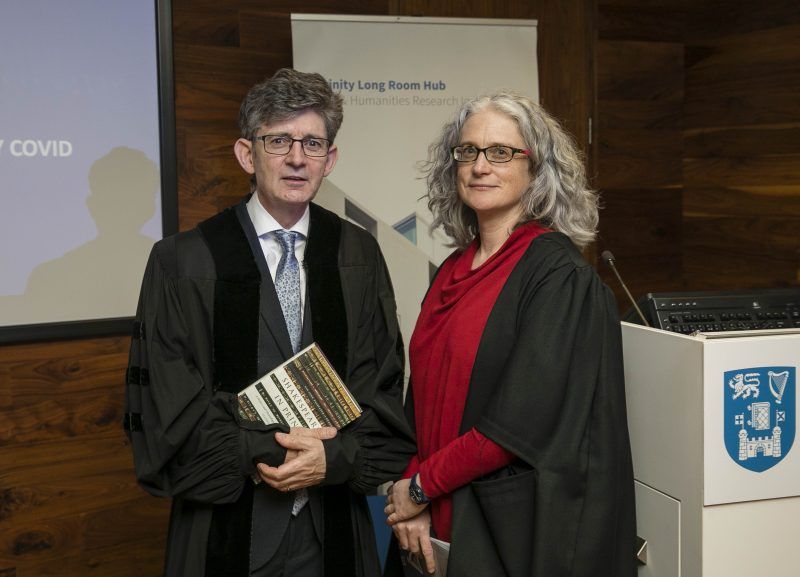How unknown small-scale publishers helped catapult Shakespeare to global popularity
Posted on: 03 November 2021
The unknown small-scale publishers who helped catapult Shakespeare to global popularity was the subject of Professor Andy Murphy’s inaugural lecture delivered yesterday, Tuesday, November 2nd, 2021.
In a lecture entitled ‘Shakespeare from the Periphery’ Professor Murphy demonstrated how Shakespeare’s position as a central figure in global culture is due in part to the efforts of a set of little known figures operating – largely unremarked – in the cultural periphery.
“When Shakespeare’s rise to prominence is considered oftentimes the role of marginal figures and in particular, of small-scale, speculative publishers, has been overlooked. We tend to assume that the great richness of Shakespeare’s writing has always been recognised and that readers must always have wanted to buy his work. In fact, however, a market for Shakespeare’s work had to be created by publishers of various kinds, many of them relatively undistinguished figures who happened, in a given period, to feel that the plays might help them turn a profit.”
The event was held to mark Professor Murphy’s appointment as Professor of English Literature (1867) at the School of English. A Trinity tradition, an inaugural lecture represents the official recognition of an academic’s promotion to Professor. The lecture provides an opportunity for the new professor to showcase their achievements in research, innovation, engagement and teaching activities before an audience of members of the University community and the general public.
In his talk Professor Murphy explored four instances where Shakespeare’s cultural profile has been boosted by the work of figures sitting, in essence, on the margins of mainstream culture.
“In Shakespeare’s own time, the first person to take a punt on publishing one of the plays was a man called Thomas Millington, who otherwise mostly specialised in cheap popular texts such as single page ballads and short sensationalist texts. My argument is that he provided ‘proof of concept’ that it was worth publishing Shakespeare. In the 18th century another small-scale operator, Robert Walker – who sold ‘snake oil’ type medications as well as books – challenged the notion that Shakespeare’s plays were still under copyright, entering into a price war with the main publisher of Shakespeare, with the result that the price of the plays fell to less than 10% of what they had been.”

“In the following century John Dicks, a publisher with a working-class background, figured out that wafer-thin profit margins would provide a good living if he could achieve bulk sales. He offered a complete Shakespeare for just 12 pence – far and away the lowest price that a volume of that kind had ever been offered for (in Shakespeare’s own time a single play sold for 6 pence). Dicks reckoned he sold more than a million copies of his Shakespeare.”
“Finally, there is the case of the obscure computer programmer called Grady Ward, who produced the first digital complete works. Ward himself seems to have had little interest in Shakespeare, but the files of his text have been used for almost all free-to-access Shakespeare texts, including most apps. By a (very) conservative estimate, I would say that probably around 50,000,000 people have made use of digital texts based on Ward’s work.”
“It has been in the periphery that Shakespeare’s central position has been forged. And so it has been too in our own time. The Shakespeare of the present and future has come once again, and as always, to the centre from the margins.”
About Professor Murphy:
Andy Murphy was born in Limerick City. He worked in local government for a number of years before undertaking a degree in English and Psychology here in Trinity, graduating in 1986. He then worked for a spell for the London Borough of Waltham Forest, before moving to the US and studying at Brandeis University in Massachusetts, receiving his MA there, and graduating with a PhD in 1994. After his postgraduate work, Andy settled in the UK, working as a Postdoctoral Research Fellow at the University of Hertfordshire and then becoming a lecturer there. He moved to the University of St Andrews in 1998, remaining there for 20 years and serving eventually as Head of the School of English, and then Director of the Graduate School and Provost of St Leonard’s (St Andrews’ postgraduate college).
Andy’s research interests lie in the fields of Shakespeare Studies and Irish Studies – and he also works at the intersection of these two areas of study. His first monograph was an exploration of the Irish context of early modern English literature, entitled But the Irish Sea Betwixt Us: Ireland, Colonialism, and Renaissance Literature. He followed this with a history of Shakespeare editing and publishing, ‘Shakespeare in Print: A History and Chronology of Shakespeare Publishing’. First published in 2003, the book has recently been re-issued in a revised and expanded new edition. He explored the growth of Shakespeare’s readership in the nineteenth century in Shakespeare for the People: Working-class Readers, 1800 1900, published in 2008. His most recent book is a study of literacy and nationalism in Ireland, entitled ‘Ireland, Reading and Cultural Nationalism, 1790-1930’. Andy has also published a short study of Seamus Heaney’s poetry, issued in three editions in the ‘Writers and the Work’ series. Andy has received fellowships in support of his work from the Royal Society of Edinburgh, the British Academy and the Leverhulme Trust. He is currently completing work on an edited collection on ‘The Nation’ for the Cambridge University Press ‘Cambridge Themes in British Literature and Culture’ series and is working on a new edition of Shakespeare’s Henry V, also for Cambridge University Press.
Cover picture attribution: Steve Evans from Citizen of the World, CC BY 2.0, via Wikimedia Commons
